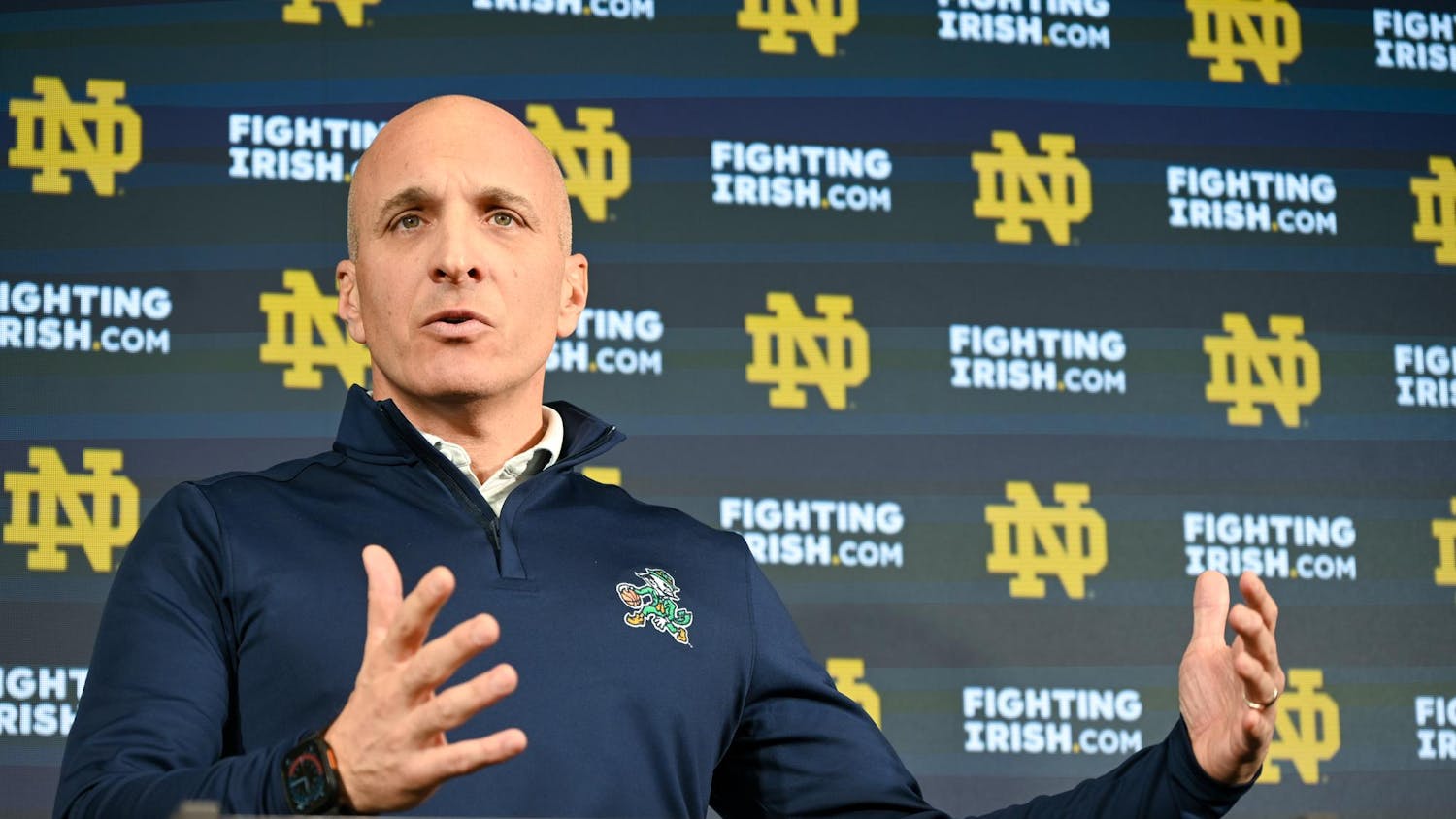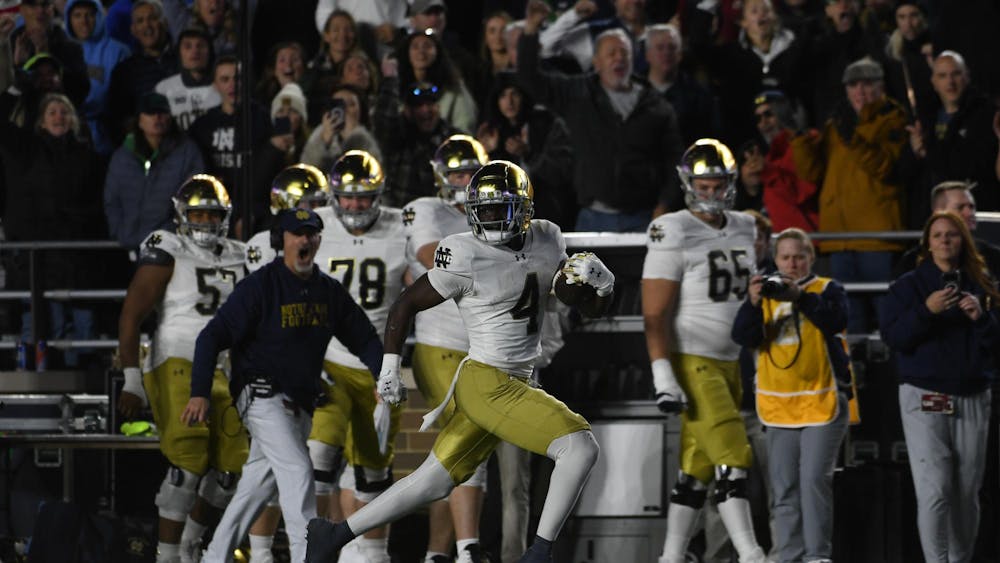
Full circle.
As Irish senior linebacker Te’von Coney comes to the end of a Notre Dame career marked by both highs and lows, it’s easy to see that the Florida native has come a long way, both on and off the field.
But, perhaps more surprising, it’s revealing to see his mentality has never changed.
“Anything that I endure or experience, to always overcome it,” Coney said of his mentality. “And that’s something that I always did when I was younger, something my dad instilled in me as well. No one’s perfect — whenever you make a mistake, it’s not about doing another mistake, it’s about moving forwards and finding a way to get better.”
Coney was a late bloomer in high school, during which he transferred to Palm Beach Gardens High School. Heading into his junior season without a single offer, Coney put in the work over the offseason — in the weight room, on the field and in the film room. The result? 172 his junior year, 136 the following season as a senior and an invite to the Under Armour All-American game.
Heavily recruited by a number of local schools, including Miami, Coney wasn’t initially on Notre Dame’s radar, and vice versa. But when then-recruiting coordinator Tony Alford direct messaged the then-junior on Twitter, Coney was all ears.
“[He] asked to just talk to me, just to give the whole idea of Notre Dame a chance, knowing that I’m a Florida guy, knowing how far it is from Florida,” Coney said. “I gave him the opportunity, heard him out and loved a lot of the things he talked about, as far as education, and valuing family, friends and a high level of football. So that was something that I was interested in coming out [to explore more] and coming up here and checking it out.”
Notre Dame’s unique blend of academic and athletic prestige was an immediate selling point for Coney and his work ethic, and the Irish soon had his commitment, followed by his early enrollment. For Coney, it was the perfect opportunity to grow with the team, especially behind star linebacker and eventual-Butkus award winner Jaylon Smith.
“I kind of got it right away. I always had a really good mentor, Jaylon Smith, who always had my back,” Coney said on the transition. “Any time I had any questions, he was there to answer them all, so I would say it was an easy transition for me from high school to college. All the veteran guys, they loved me, I loved those guys, they treated me like a little brother. Any time I needed a ride somewhere, needed help, they were always there for me.”
Coney’s relationship with Smith blossomed, but the success on the field stagnated. With the talent in front of him on the depth chart, Coney’s role was largely reduced to special teams, and a shoulder injury sustained in the Fiesta Bowl then kept him out of spring ball.
But the real damage came in August. Just before the Irish kicked off the 2016-17 season, Coney and five other players were arrested after a traffic stop discovered marijuana and a unlicensed handgun.
Of the six mugshots, Coney’s is the only one with face downcast. As someone who had never had any run-ins with the law, Coney was ashamed. But instead of slipping further, he rose to the challenge of growing from the mistake.
Smith backed him every step of the way.
“Just putting it behind me. Just growing from it,” Coney said on what Smith told him after the incident. “He always told me that my four years here wouldn’t be perfect. … That’s one thing that Jaylon also told me as well, is that to move on, just learn from mistakes and do better in the future, and everything will be fine.”
While the Irish sputtered that season to a 4-8 record, Coney pushed himself to get better. Even after wholesale offseason changes saw the system implemented by former defensive coordinator Brian VanGorder — and Coney’s starting role — abandoned under new coordinator Mike Elko, the then-junior stayed focused.
“Keep going. Never stop. That’s always been my mentality growing up, is to always better, and then when that adversity hits, and challenges come to me, never give up, never break and continue to get better,” Coney said on his approach. “In that offseason, I found a lot of ways to get better. I was in the coaches’ offices, finding ways, how can I improve, how can I be a better player, on and off the field. I listened a lot, and learned a lot that offseason and got a lot better as well.”
Of the seven new coaches hired by Brian Kelly that offseason, two became particularly important for both Coney and Notre Dame. Strength coach Matt Balis, known for his pedigree, ushered in a new era, an era that Coney, perhaps more than any other, benefited from.
“I’m so happy that I had a guy that came in during that time who’s seen where my future can go if I put a lot of hard work in,” Coney said on his relationship with Balis. “He constantly challenged me each and every day I came in the weight room, not to be average, to find a way to get better at something. He’s seen a lot of weaknesses that I’ve had that I could turn into strengths easily if I continued to just work on them … he pushed me to the limit, to new levels I never thought I could get to. To this day, I thank him for finding me ways to get better to help me with my success on the field.”
Another key mentor for Coney was Clark Lea, who followed Elko to be linebackers coach. When Elko left after 2017, Lea took over defensive coordinator duties as well, and has been particularly demanding of Coney, as the senior has emerged as a key player on defense. Through all the hard work, Coney has great respect for Lea’s desire to help him get better.
“We have a guy that you can’t ask more from,” Coney said on Lea. “He comes in each and every day and he challenges me, as a person, as a young man, to grow. And on the field, he challenges me as well to continue to get better, to find ways to move the meter. ‘To move the meter,’ that’s what he always says. It’s someone who’s always been there for me, his door is always open, whenever I want to talk about anything, outside of football, whatever it is. It’s great to have a guy like that.”
Under their tutelage, Coney has blossomed into a force for the Irish. Despite not starting the season as the starter in 2017, he led the team in tackles as Notre Dame remade itself on defense. While there was talk on whether Coney would declare early for the draft, Coney was far from satisfied with his Notre Dame career.
“I wanted to finish, I wanted to graduate and I felt like I didn’t do what I really wanted to do,” he said on his decision to return for senior year. “I wanted to be a national champion, and I wanted to come here and graduate. Those are two things that I set as goals before I came here, and just having the opportunity to be at this University for another year, I decided I couldn’t pass it up. It’s a special place with special people, and I would’ve missed it a lot. So just having the opportunity to come back, with a great group of guys, try to get a national championship and also graduate, it was something I couldn’t turn down.”
This year, Coney and the Irish have emerged as one of the nation’s premier contenders for an elusive playoff spot. Now starting at inside linebacker — once again leading the team in tackles — and having younger players look up to him as an example, Coney recognizes how his mentality has paid off.
“It’s been great. That’s something I’ve always wanted to do, to be a leader for this great university, and for this great team as well,” he said. “Just having the opportunity to lead these guys, it’s been awesome. We all learn from each other, from every level of the defense. We challenge each other each and every day to get better. We got D-linemen challenging me, I’m challenging the DBs and vice versa. We are always trying to find ways to get better.”
With his growth, both on and off the field, tied so much to important influences, Coney hasn’t lost sight of what got him to where he is today — he and Smith still talk regularly. Relationships like theirs are something that he now stresses to the next crop of Irish football players.
“I know that any time I need to talk to someone, I can pick up the phone and call him, and anytime he wants to talk to me as a big brother and give me advice, he always picks up the phone and calls me,” Coney said of his current communication with Smith. “We have a great relationship, and I’m really happy to have a guy here to teach me the way, teach me the way of how I can become great at this great University like he did. To this day, I tell the younger guys some of the same things he told me when I first came in, and to help those guys be great players, on and off the field as well.”
Moving The Meter: Built on the strength of his relationships, Te’von Coney’s character has led both him and the Irish from disgrace to distinction
Ann Curtis & Dominique DeMoe | The Observer
Ann Curtis & Dominique DeMoe | The Observer









